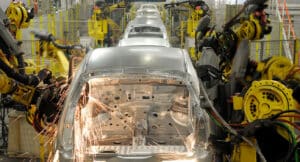5G is much more than the next G. So far we’ve built single purpose networks. 2G was for voice, 3G was an attempt to provide browsing (best effort data network) and 4G finally delivered the promise. It is important to realize that there are many proprietary networks for many purposes in Europe. Tetra is used in public safety, satellites in TV productions, microwave links to connect electricity stations and in some places still there are voice services for taxi and lorry drivers without forgetting communication in air traffic and on the seas.
Networks outside of 4G are very expensive to use and buy end user equipment. But they are also very inefficient when considering data rates. We have a dream about Industry 4.0 where everything is automated. This will bring us significant improvement on productivity, it is not only incremental development but jump to the new level. This will happen for sure but it will require a communication network that is reliable, high bandwidth, coverage everywhere and especially low cost. This is the challenge 5G tries to answer. One network that meets all needs from different verticals. It is a combination of all proprietary networks with a cost level that is significantly lower than today in proprietary networks.
Current networks are standalone networks, a network is a kind of machine that does whatever it likes. We say that the air interface can’t be controlled and no service level agreements can be made. This is not actually true, but the latest 5G has to change this belief. From the 5G network you can order whatever service you need, but “you” means here also devices and SW. 5G will be an API driven ecosystem that we are experiencing today in Cloud computing. This is like electricity networks today.
Why is this so problematic for Europe? There are two major issues.
- Europe has over 25 regulators. This means a significantly higher cost level, but also lack of innovation. Regulation is different in every country and the regulator has significant power. Europe is very fragmented market with over regulation
- Another reason why API based ecosystems are difficult for European companies is based on culture. For example in Finland we are world leaders when it comes to paper machinery and harvesters. These are machines we have incrementally improved for decades. In SW base ecosystem product life cycle is even in the best case 20 years (Windows, Oracle) and most of the projects will fail. There is a major risk that if I start developing the next generation OS or DB it won’t be successful. Those who are successful have taken significant risk, went to the market far too early, break regulation or at least done things that have not been done before. Technology develops always before it can be regulated. This is very problematic to European mentality.
The value in the 5G value chain is not in networks or devices but the data devices will generate. Now the big question is that are Europeans fast enough to capture their fair share. If you think about harvester, the value is in the date the machine will collect the tree it has cut. Who owns that data is the big opportunity!






